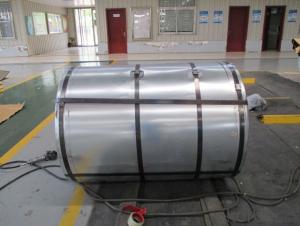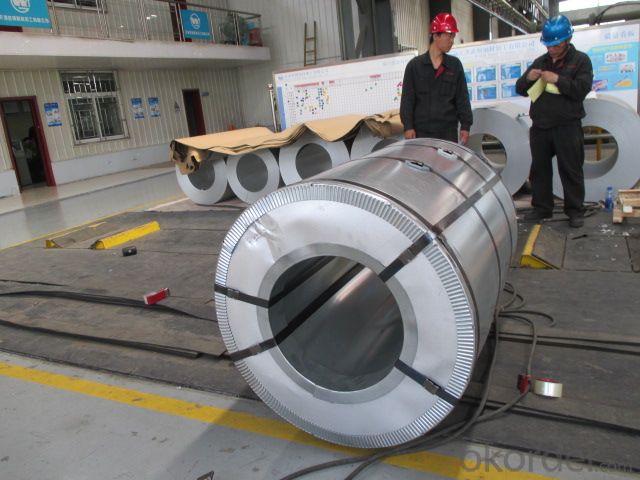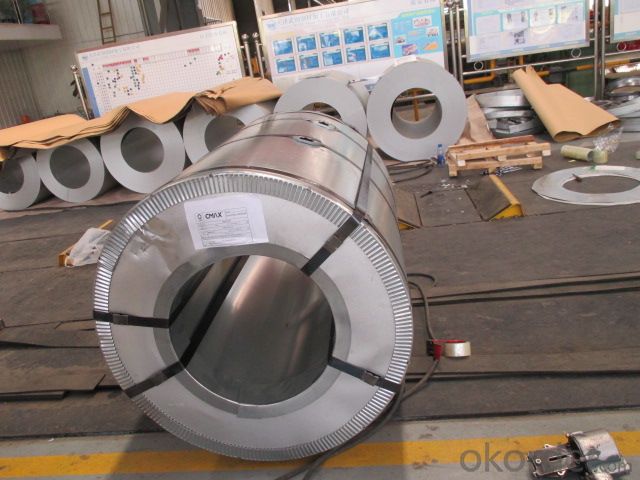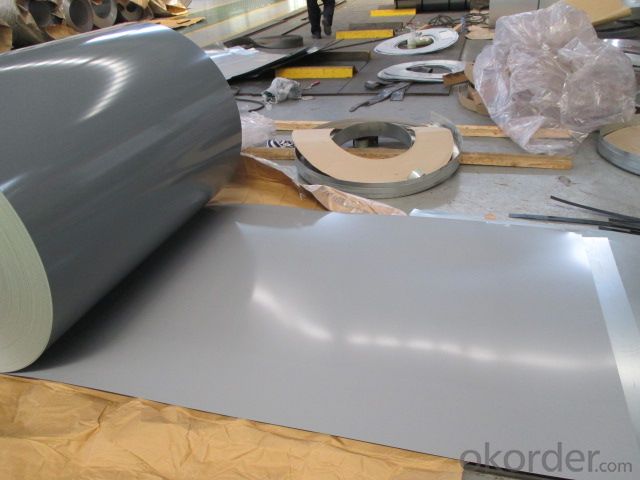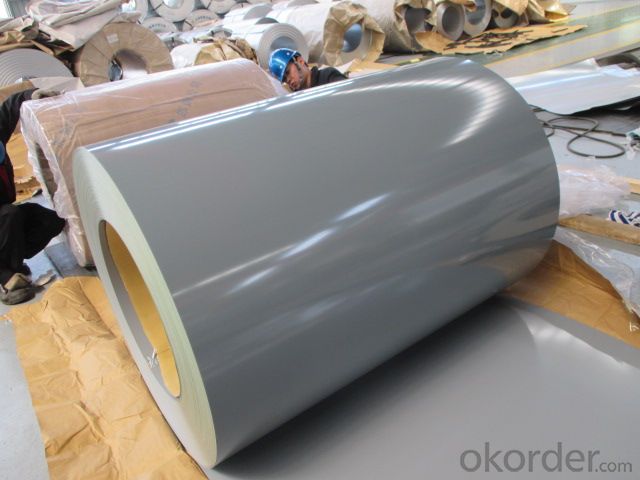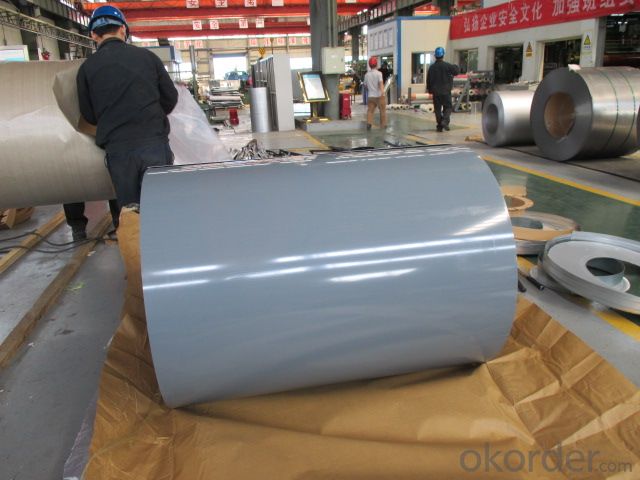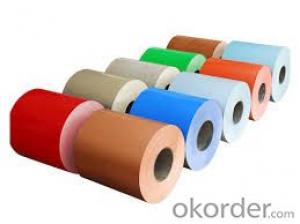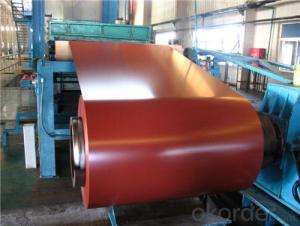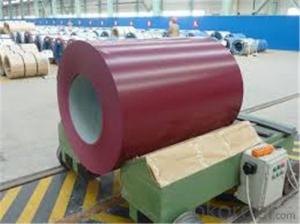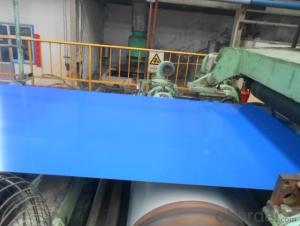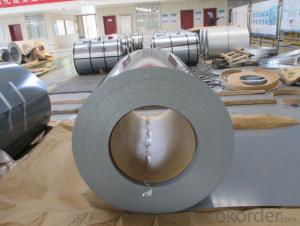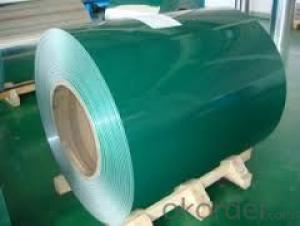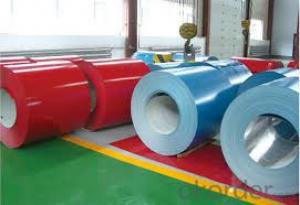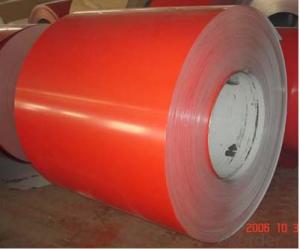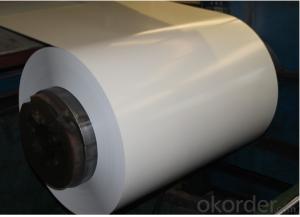hot Prime PPGI Prepainted galvanized steel coils sheets good price from China for roofing
- Loading Port:
- Shanghai
- Payment Terms:
- TT OR LC
- Min Order Qty:
- 10 m.t.
- Supply Capability:
- 100000 m.t./month
OKorder Service Pledge
OKorder Financial Service
You Might Also Like
Specifications
1.Base material: hot dipped galvanized steel coil DX51D
2.Thckness ; 0.16-1.5mm
3.WIdth : 914-1250 mm
4.Zinc : 40-180g
Specification :
1.Thickness : 0.16-1.5 mm
2.Width: 914-1250 mm
3 Zinc coating : 40-180 g
4 coil ID : 508MM/610 MM
Products detailed description:
1> original : China
2> base material : hot dipped galvanized steel coil DX51D
3> coil weight : 3-7 tons
4> T bent test : 1t -3 t
5> pencial hardness : F--H--3H
6> Repercussions impact test : 9 J
7 > Standard : JIS G 3312 ,3302 EN 10146 10169
8> Container standard : 20‘ 40’
9>Delivery detail : within 20-30 days after receving the deposit
10>NEK TEXT : 100 '
11>payment terms : L/C or T/T
12>packing detail :standard sea worthy packing
- Q: i have a white spot on my stainless steel stove, its on the part behind the burners where the oven controls are, does anyone know what it may be and how to remove it. i have tried soap and water and stainless steel cleaner but neither worked. thanks!
- Baking soda mixed with liquid dish soap can make a good paste to gently rub on stains. Be sure to rinse the stainless steel surface thoroughly, and towel dry. If the stains still remain you can try vinegar. Remember to thoroughly rinse and towel dry. If stains still remain I recommend trying a stainless steel cleaner and polisher. Barkeeper's Friend is a good powder formula that can clean without scratching. Be sure to follow the directions, rinse thoroughly, and towel dry. These methods should help remove the discolorations
- Q: How are steel coils used in the production of storage racks?
- Steel coils are used in the production of storage racks by being uncoiled, cut, and shaped into the required dimensions and components of the racks. These steel coils provide the necessary strength and durability to support heavy loads and ensure the stability and longevity of the storage racks.
- Q: How do steel coil manufacturers ensure employee safety?
- Steel coil manufacturers ensure employee safety through a combination of measures and protocols aimed at preventing accidents, promoting awareness, and providing appropriate training and protective equipment. Firstly, manufacturers conduct regular safety audits to identify and rectify potential hazards in the workplace. This includes inspecting machinery, equipment, and facilities to ensure they meet safety standards and are properly maintained. To promote a culture of safety, manufacturers implement comprehensive safety training programs for all employees. These programs cover topics such as proper handling of equipment, safe material handling practices, and emergency procedures. Additionally, manufacturers provide ongoing training to employees to ensure they are up to date with the latest safety protocols and best practices. Personal protective equipment (PPE) is an essential component of employee safety in steel coil manufacturing. Manufacturers ensure that employees are provided with and trained on the proper use of PPE, including safety glasses, gloves, helmets, and protective clothing. Regular checks are conducted to ensure that PPE is in good condition and replaced as necessary. Manufacturers also implement engineering controls to minimize risks in the workplace. This may include installing safety guards on machinery, implementing automated systems to reduce manual handling, and using advanced technology to monitor and control potential hazards. Regular maintenance and inspections are conducted to ensure that these controls are functioning effectively. Furthermore, manufacturers maintain a strong emphasis on communication and employee involvement in safety programs. This includes encouraging employees to report hazards or near-miss incidents, conducting safety meetings and toolbox talks, and actively involving employees in safety committees or teams. Manufacturers also foster a supportive environment where employees feel comfortable reporting safety concerns or suggesting improvements. Overall, steel coil manufacturers prioritize employee safety through a combination of measures, including regular safety audits, comprehensive training programs, provision of PPE, implementation of engineering controls, and fostering a culture of communication and employee involvement. These efforts contribute to creating a safe and secure working environment for all employees.
- Q: How do steel coils contribute to the renewable energy sector?
- The renewable energy sector benefits from the utilization of steel coils in multiple ways. To begin with, wind turbines rely on steel coils for their construction. The towers of these turbines are crafted using steel, and structural components are fabricated from steel coils. The exceptional strength and durability of these coils enable them to withstand the harsh environmental conditions commonly found in wind farms. Furthermore, solar panels also depend on steel coils during their production. Steel is utilized to create frames and support structures that securely hold the panels in place. These frames must possess sufficient strength to endure various weather conditions, and steel coils offer the requisite stability and robustness. Additionally, steel coils are essential in the development of transmission lines that transport electricity generated from renewable sources. Steel is widely employed for constructing the poles and towers that support these transmission lines, as it affords the necessary strength to bear the weight of the cables and endure extreme weather conditions. Moreover, energy storage systems, which play a crucial role in storing surplus energy from intermittent renewable sources like wind and solar, are heavily reliant on steel coils. Battery enclosures and racks are fabricated using steel coils to ensure the safety and stability of these systems. In summary, steel coils make a significant contribution to the renewable energy sector by providing the strength, durability, and stability required for various infrastructure components. Their utilization in wind turbines, solar panels, transmission lines, and energy storage systems supports the growth and advancement of renewable energy sources, thus establishing them as an indispensable element in the transition towards a greener and more sustainable future.
- Q: im writing a book.-how is steel made? like, from what natural resources?-is there a type of factory that just prouduces steel to then be made into the various things made out of steel? if so, what kind of company might that be?-what is the first stage of steel, like, right after the other....ingrediants......are mixed, but before it is shaped into whatever its destined to be?thank you so much, i really appreciate it!
- That is an ENORMOUS subject that won't fit in this little box. Run an internet search on steel making. Essentially, steel is an alloy of iron and other metals chosen to give it the desired properties. These metals usually come from ores that are extracted from the earth. Actually, iron has too much carbon for most steel making purposes, and the carbon must be burned off. Iron is melted in a blast furnace, and oxygen is used to burn off the excess carbon. Then the molten metal is mixed with molten alloy metals and poured into molds to make ingots, which are blocks of steel of a size convenient for handling. Steel can also be made by re-melting scrap metal and adjusting the amounts of various adulterants or alloy metals at molten temperatures. The ingots are taken to rolling mills to be shaped into rods, pipes, sheet metal, and structural shapes. Molten iron and steel can also be poured into molds to produce complex shapes.
- Q: What are the different types of steel coil cuts?
- There are several different types of steel coil cuts that are commonly used in various industries. These cuts are made during the steel manufacturing process to produce steel coils of different sizes and shapes, which can then be used for different applications. 1. Slit Coil: Slit coil is one of the most common types of steel coil cuts. In this process, a large steel coil is cut into narrower strips or slits. Slit coils are typically used for applications that require smaller widths, such as automotive parts, appliances, and construction materials. 2. Sheet Coil: Sheet coil is another type of steel coil cut that involves cutting a large coil into flat sheets. These sheets can be further processed to create different products, such as roofing materials, cladding, or fabrication components. 3. Blanked Coil: Blanking is a process in which a steel coil is cut into custom-shaped blanks. These blanks can be used for various purposes, such as forming into different parts, stamping, or machining. Blanked coils are commonly used in industries like automotive, aerospace, and manufacturing. 4. Precision Slit Coil: Precision slit coil is a specialized type of coil cut that involves cutting the steel coil with high precision and accuracy. This process ensures consistent width tolerances throughout the coil, making it suitable for applications that require precise dimensions, such as electrical components, precision tools, and automotive parts. 5. Oscillate Wound Coil: Oscillate wound coil is a unique type of steel coil cut that involves winding the steel strip in a zigzag pattern rather than a traditional flat coil. This method allows for tighter coil winding and can maximize the amount of steel on a coil. Oscillate wound coils are commonly used in industries that require high-volume production, such as stamping and roll forming. Overall, the different types of steel coil cuts cater to the specific needs of various industries, providing them with the flexibility to create products of different sizes, shapes, and dimensions.
- Q: How are steel coils used in the manufacturing of automotive frames?
- Steel coils are used in the manufacturing of automotive frames by being shaped, cut, and welded into different sections to create the structural framework of the vehicle. These coils provide the necessary strength and durability required to support the weight of the vehicle and withstand various stresses, ensuring the safety and stability of the automotive frame.
- Q: Can steel coils be coated with heat-resistant materials?
- Yes, steel coils can be coated with heat-resistant materials. Coating steel coils with heat-resistant materials provides protection against high temperatures and ensures the durability and longevity of the coils in various industrial applications.
- Q: How are steel coils protected against corrosion?
- Steel coils are protected against corrosion through various methods such as applying protective coatings like zinc, aluminum, or polymer, or using a process called galvanization where the coils are coated with a layer of zinc. Additionally, storing the coils in a controlled environment with low humidity and proper ventilation also helps prevent corrosion.
- Q: What brand steel tapes are of good quality?
- Personal feeling is also good for the Great Wall Seiko tape, upstairs several estimates are the production of steel tape manufacturers, of course, that their goods well. Our unit now buy all the Great Wall Seiko goods, said the tape is good, not because it is so durable
Send your message to us
hot Prime PPGI Prepainted galvanized steel coils sheets good price from China for roofing
- Loading Port:
- Shanghai
- Payment Terms:
- TT OR LC
- Min Order Qty:
- 10 m.t.
- Supply Capability:
- 100000 m.t./month
OKorder Service Pledge
OKorder Financial Service
Similar products
Hot products
Hot Searches
Related keywords
